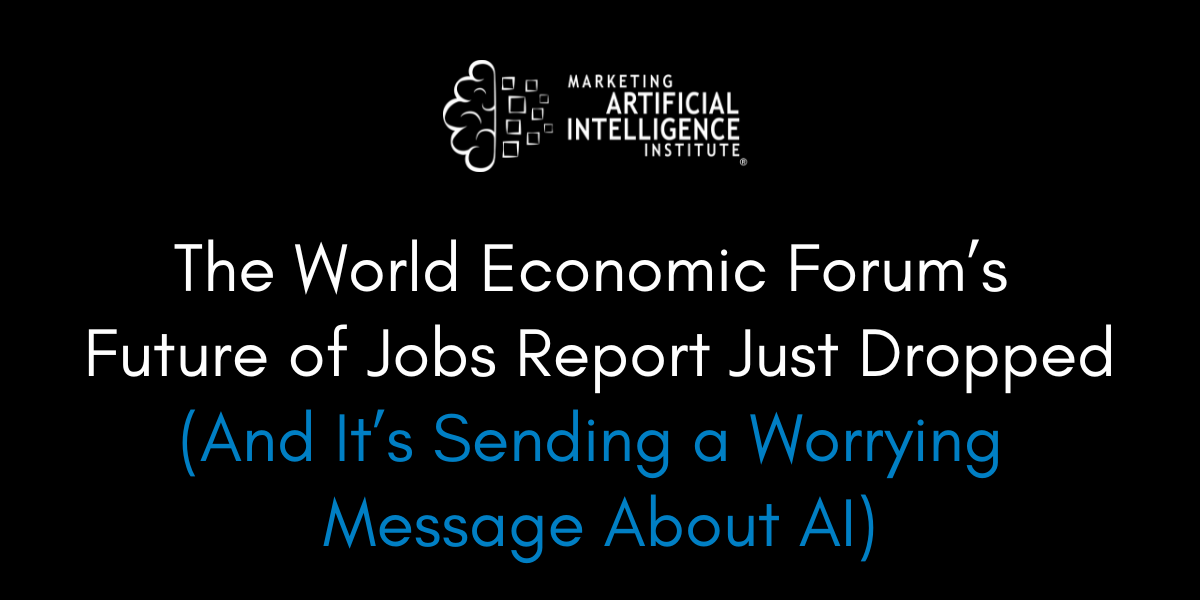The World Economic Forum (WEF) has released its latest Future of Jobs Report, and it’s making one thing crystal clear:
AI is going to transform the global workforce sooner rather than later.
The 290-page report—pulling data from more than 1,000 top global employers, collectively representing over 14 million workers across 22 industries and 55 economies—offers a fascinating (and at times sobering) look at how organizations plan to respond to accelerated AI adoption.
But the most attention-grabbing statistic? 40% of these employers anticipate reducing their workforces where AI can automate tasks.
And that’s just the beginning of the story.
I sat down with Marketing AI Institute founder and CEO Paul Roetzer on Episode 130 ofThe Artificial Intelligence Show to break down the most surprising takeaways. (Hint: You might want to drop the entire 290-page report into a tool like NotebookLM to get a quick, powerful summary.)
Big Revelations About AI and Jobs
Before diving into the specifics, there's an important caveat to consider about this type of research, says Roetzer.
"They are relying on people who may not fully understand AI to answer questions about the impact of AI," he notes. "There's a reasonable chance that people they're interviewing don't actually fully comprehend the state we're in right now."
With that caveat, the report contains a sea of eye-opening stats and forecasts. And three jump out more than others:
- Half of employers plan major business reorientation around AI. And two-thirds of them say they’ll hire talent with specific AI skills to pull it off.
- 40% of employers expect to reduce their workforce where AI can automate tasks. That’s a significant number, given the scale of global employment these businesses represent.
- Upskilling is the #1 strategy. To cope with this disruption, a whopping 77% of employers plan to equip existing employees with new skills by 2030 so they can work effectively alongside AI
The report adds another note of caution here:
“Without appropriate decision-making frameworks, economic incentive structures, and possibly government regulations, there remains a risk that technological development will be focused on replacing human work.”
Translation? The trajectory of AI adoption could either help us collaborate with machines for outsized gains—or lead to greater inequality and job displacement, depending on how businesses and policymakers respond.
The Biggest Problem Companies Have with AI
One of the most intriguing parts of the report is its deep dive into which skills matter today—and which will matter tomorrow. According to the report, the top current core skills desired by employers are:
- Analytical thinking
- Resilience
- Flexibility and agility
- Leadership and social influence
- Creative thinking
And the fastest growing skills in the next 5 years are:
- AI and big data
- Networks and cybersecurity
- Technological literacy
- Creative thinking
But there’s a big problem here. The report finds that employers say the biggest barrier to AI adoption is a lack of skills. 50% of respondents said this was an issue. (And the findings in our 2024 State of Marketing AI Report support that conclusion.)
Unfortunately, companies right now are struggling to fill this skills gap in the US, says Roetzer.
“It’s rare that we see large-scale upskilling programs in the US right now. Most AI skills training we see comes from proactive employees paying out of pocket or learning on their own time,” he says. This is also validated in the 2024 State of Marketing AI Report, where 75% of respondents said they do not have access to formal AI education and training at their company.
The good news is: that’s starting to change—likely due, in part, to the pain points outlined in the WEF report.
“I think that that will shift in 2025,” Roetzer says. “I believe that we are entering a phase where enterprises are going to realize the urgency to reskill and upskill their workforces.”
What Should You Do About It?
So, what do you actually do about all this? Roetzer recommends four steps.
- Get educated on AI. Whether you’re a C-suite exec or a college student, it’s time to build an AI skill set. That could mean taking specialized online courses, exploring prompt engineering, or diving into generative AI tools.
- Invest in upskilling programs. The WEF report is clear: reskilling your workforce to complement AI is the biggest lever companies can pull to navigate the changes ahead.
- Build a vision from the top down. Without executive understanding of AI’s real capabilities and challenges, organizations risk underinvesting (or overreacting) and losing competitive edge.
- Balance the human element. The report warns that empathy, active listening, and other human-centric skills remain a vital differentiator. Right now, even the best AI can’t replicate nuanced human interaction. Lean into that.
Bottom Line: Disruption (and Opportunity) Are Closer Than You Think
The Future of Jobs Report paints a picture of big workforce disruption driven by AI.
While half of employers are ramping up AI strategies and two-thirds plan to hire AI talent, nearly four in ten anticipate layoffs. At the same time, almost 80% intend to upskill their workers to handle these new technologies.
So, brace yourself—2025 and beyond could look radically different than any of us imagine. And if the WEF’s latest findings are any guide, the time to prepare for those changes is today.
Mike Kaput
As Chief Content Officer, Mike Kaput uses content marketing, marketing strategy, and marketing technology to grow and scale traffic, leads, and revenue for Marketing AI Institute. Mike is the co-author of Marketing Artificial Intelligence: AI, Marketing and the Future of Business (Matt Holt Books, 2022). See Mike's full bio.



